globalwarming
Latest
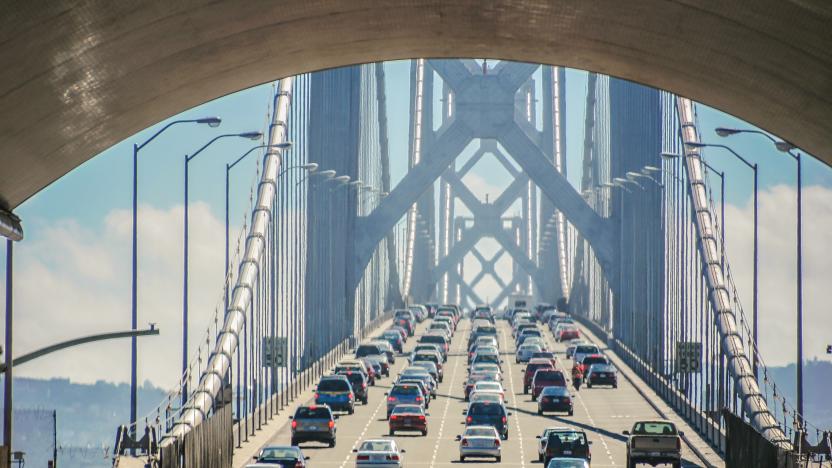
Ford, BMW and others sign binding emissions agreement with California
They've committed to building cars that outperform federal fuel efficiency standards.
Kris Holt08.18.2020
UPS hybrid trucks automatically switch to EV mode in cities
UPS has unveiled hybrid electric trucks that not only quadruple the range of previous vehicles, but automatically switch to battery-only mode in UK cities and clean-air zones. On top of that, the trucks (built by EV startup Tevva) will have the same cargo capacity as like-sized diesel trucks. The aim, said UPS and Tevva, is to get ready for the UK's strict "Net Zero" laws that will completely cut CO2 emissions by the year 2050.
Steve Dent09.04.2019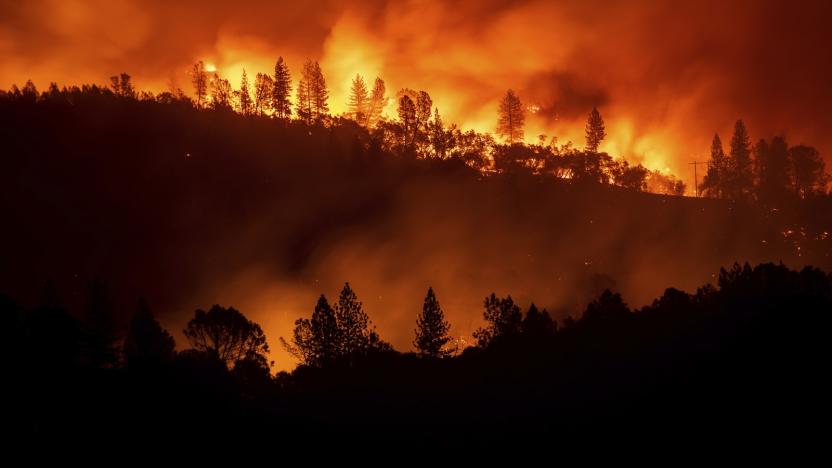
CO2 levels are the highest since humanity began
CO2 levels on Earth have officially hit 415 parts per million (ppm), according to readings taken at the Mauna Loa Observatory in Hawai'i. That's the highest level since homo sapiens came onto the planet, meteorologist Eric Holthaus tweeted, and represents an increase of 15 ppm over just the past three years. "We don't know a planet like this," Holthaus said.
Steve Dent05.13.2019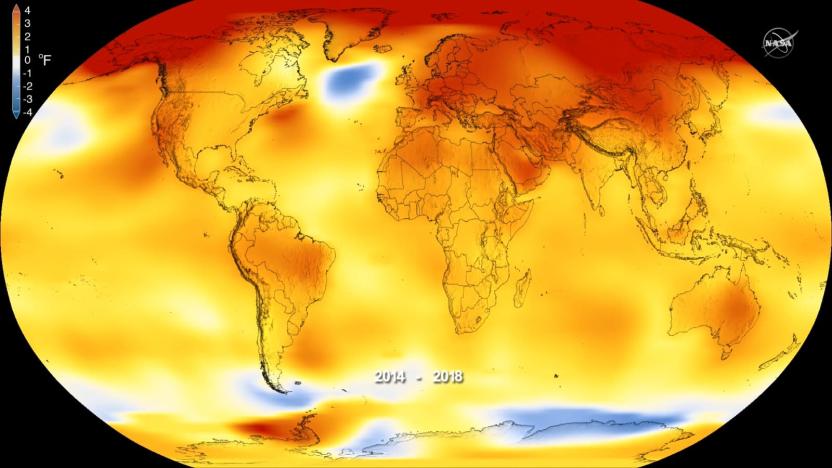
2018 was the fourth-hottest year on record
Earth's surface temperatures in 2018 were the fourth-highest of any year since records started in 1880, according to NASA's Goddard Institute for Space Studies (GISS) and the National Oceanic and Atmospheric Administration (NOAA). 2016 was the hottest year ever, followed by 2017 and 2015, and since 2001, we've had 18 of the 19 warmest years on record.
Kris Holt02.06.2019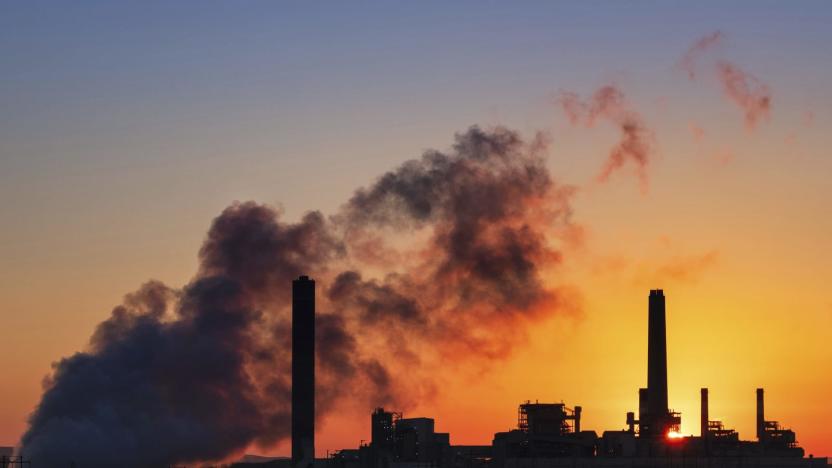
US saw the largest increase in CO2 emissions in almost a decade
The US isn't faring well in efforts to keep carbon dioxide emissions in check. Rhodium Group analysts have determined that CO2 emissions jumped 3.4 percent year-over-year in 2018, or the largest increase since 2010. The reasons for the worsening output aren't necessarily what you expect, though. The research team attributed it both to a cold winter (thus increasing the use of oil and gas for heat) and, more importantly, a then-booming economy. The growth led to greater uses of factories, aircraft and trucks that frequently aren't subject to strict environmental policies, leading to sharp upticks in emissions. Industry alone saw emissions climb by 5.7 percent.
Jon Fingas01.09.2019
Governments reach deal to implement Paris climate change agreement
Politicians signed the Paris climate agreement back in 2015, but they've finally laid the groundwork for acting on that agreement. Governments have developed guidelines, known as the Katowice Climate Package, that will determine how they implement emissions reductions starting in 2020. It establishes how nations will set targets, measure technological progress, verify effectiveness and otherwise translate the agreement's goals into reality.
Jon Fingas12.15.2018
EU aims to be 'climate neutral' by 2050
European countries have already vowed to take significant steps to curb their effect on the climate, but they're now setting a more ambitious target. The European Union now hopes to achieve a "climate neutral" economy by 2050 -- that is, zero net greenhouse gas emissions. The strategy would involve wider use of renewable energy (80 percent by 2050), a shift to electric transportation and 'decarbonizing' industry.
Jon Fingas11.28.2018
The US government knows climate change is ravaging the planet
Hurricane Katrina claimed nearly 2,000 lives when it struck the Gulf Coast of the United States in 2005, submerging New Orleans in floodwater and devastating the region for more than a decade. It was the costliest natural disaster in US history, causing more than $160 billion in damage. Hurricane Katrina was the result of human-driven climate change.
Jessica Conditt11.27.2018
Federal climate change study says US at risk of 'substantial damages'
Now that US federal agencies have determined that humans are driving climate change, they're turning their attention to the potential effects of that change... and it's not looking good. They've released the second half of the National Climate Assessment, and have determined that humans aren't doing enough to prevent "substantial damages" to the American economy, environment and health in the decades ahead. You've already seen the consequences in some cases, such as increasing numbers of wildfires and communities that have had to relocate due to rising sea levels.
Jon Fingas11.23.2018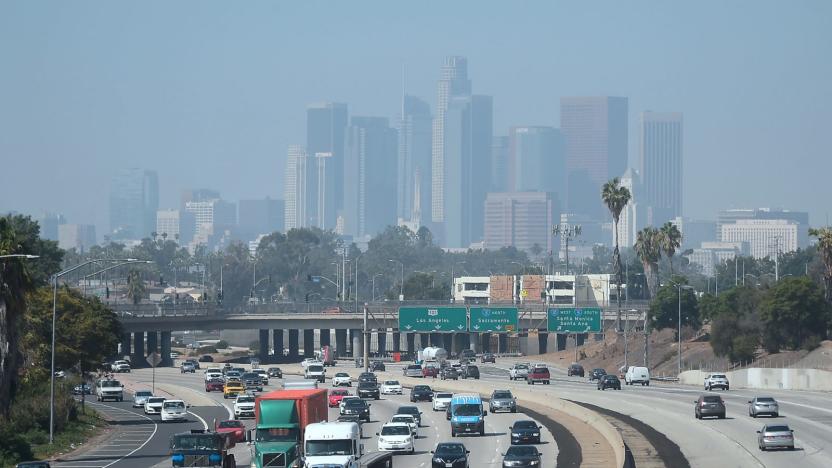
Tougher emissions rules helped cut US air pollution deaths in half
There's little doubt that air quality has generally improved in the US in recent decades, but quantifying that improvement has been difficult. However, a recently published University of North Carolina study might have produced a more tangible figure. The NASA- and EPA-backed report determined that American deaths from air pollution dropped by 47 percent between 1990 and 2010 to 71,000 per year. The researchers achieved the figures by measuring the levels of two pollutants (ozone and PM2.5) in a 21-year computer simulation and comparing that to CDC data for related causes of death in given regions, such as chronic obstructive pulmonary disease and ischemic heart disease.
Jon Fingas10.20.2018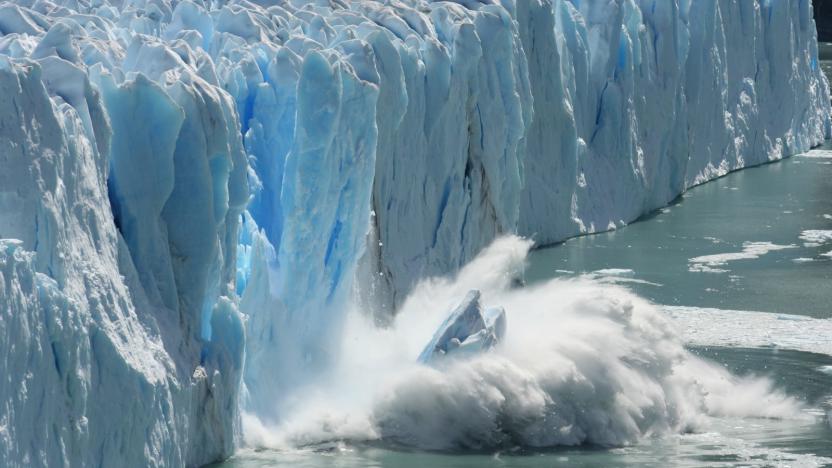
Major UN report says climate change is worse than first thought
Even if nations stick to the Paris agreement and keep global warming below two degrees, it will still be a major disaster for the planet, according to a blockbuster UN report on climate change. What's more, we now have less time to act than previously thought. If governments don't take massive action over the next decade, we could see severe food shortages, increased forest fires and large scale coral reef die-offs by 2040. The report also predicts more serious issues, including the potential migration of tens of millions of people that would increase the risk of wars.
Steve Dent10.08.2018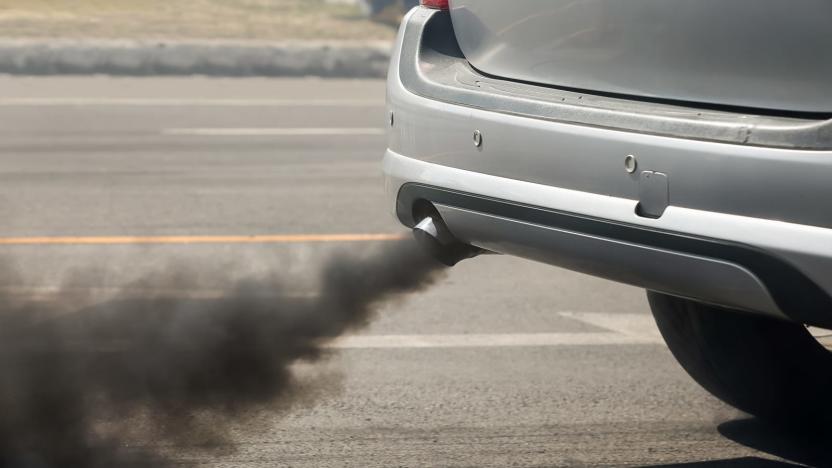
NHTSA study forecasts dangerous rise in world temperatures by 2100
The Trump administration has accepted the scientific consensus of human-made global warming. However, it's not being used to push for tougher environmental regulations -- just the opposite, in fact. In a draft NHTSA environmental impact statement for Trump's proposed fuel standards freeze, the agency predicts that the worldwide temperature will increase about 7 degrees Fahrenheit (4 Celsius) over pre-industrial levels by 2100. Rather than use that as an incentive to push for more drastic cuts in emissions, though, the report claims that there's not much point. It's allegedly "not currently technologically feasible or economically feasible" to move enough people to clean transportation to make a difference, the NHTSA argued, so why bother with tougher rules?
Jon Fingas09.28.2018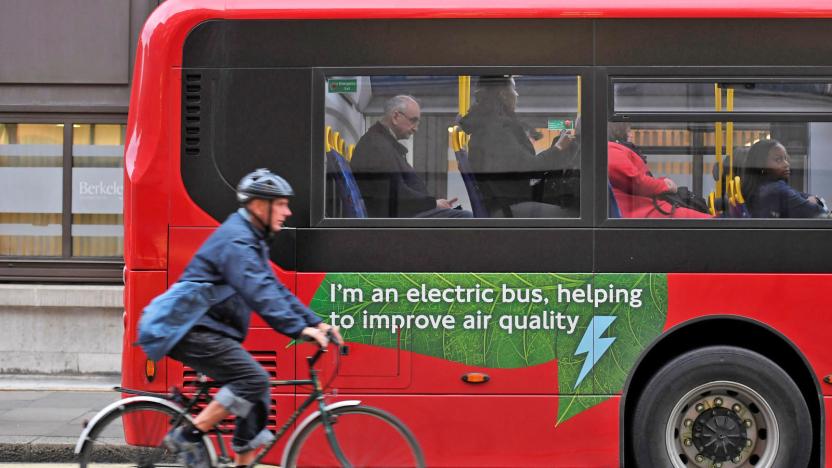
CO2 emissions in 27 major cities have declined since 2012
There is some good news about efforts to fight human-made climate change. The C40 Cities group, which unifies climate initiatives in 96 urban areas around the world, reported that CO2 emissions peaked in 27 major cities (including London, New York City, San Francisco, Paris and Toronto) by 2012, and have been declining by an average of 2 percent each year since then. Greenhouse gas levels were "at least" 10 percent higher at peak than during the most recent study, C40 said. And that's despite economies and populations that have grown since then.
Jon Fingas09.14.2018
'Minecraft' mod fosters a collaborative effort against climate change
A Minecraft modder has added some fresh gameplay issues for players to deal with in the form of climate change. Nick Porillo's GlobalWarming mod alters the atmosphere based on certain actions like smelting ores. Temperatures will rise as carbon emissions increase, leading to violent storms, forest fires and a drop in snowfall levels as climate change takes hold.
Kris Holt08.27.2018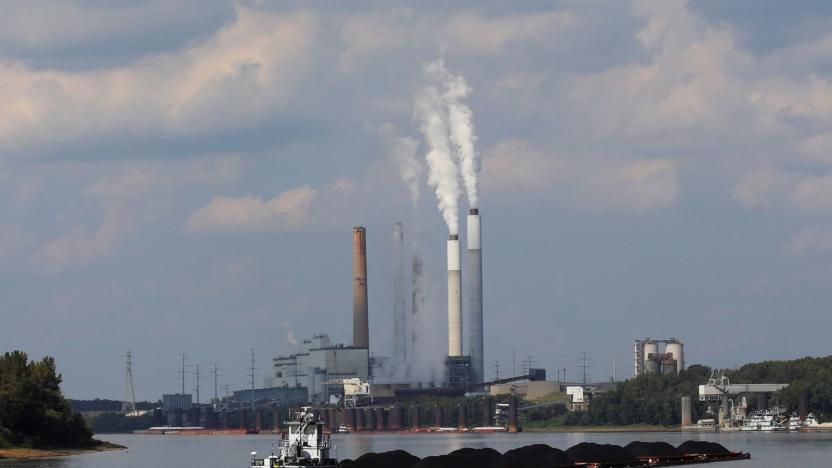
Insurance giant stops covering firms that depend on coal
The elimination of coal power isn't just good for the environment... it's quickly becoming good for the corporate bottom line. Insurance giant Swiss Re has enacted a policy that refuses coverage to any company that either generates 30 percent or more of its revenue from coal power, or uses at least 30 percent coal power to run its operations. Swiss Re touted the move as reflecting its commitment to limiting global warming (it made a pledge in 2015 alongside the Paris climate accord), but it also casts this as a shrewd business move.
Jon Fingas07.08.2018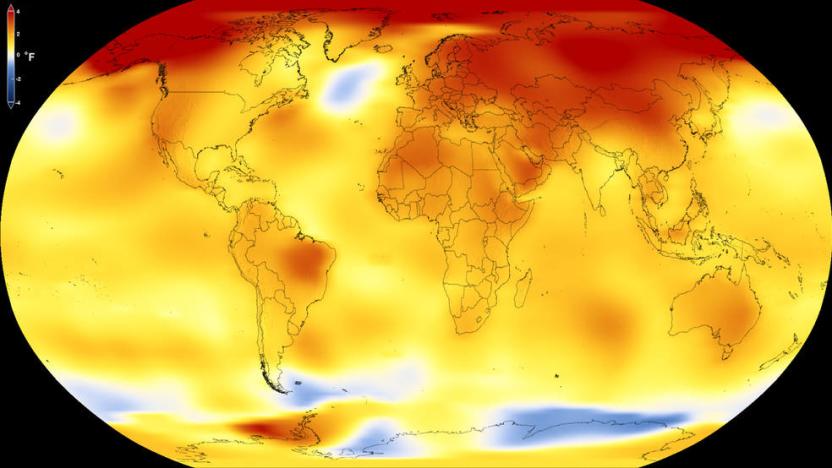
NASA: 2017 was Earth’s second-warmest year since 1880
After careful analysis, NASA has declared that 2017 was the second-warmest year since the end of the 19th century. In a separate study using different analytical methods, National Oceanic and Atmospheric Administration (NOAA) ranked last year as the third-warmest in their records. But both agree that the globe has experience its five hottest years since 2010.
David Lumb01.18.2018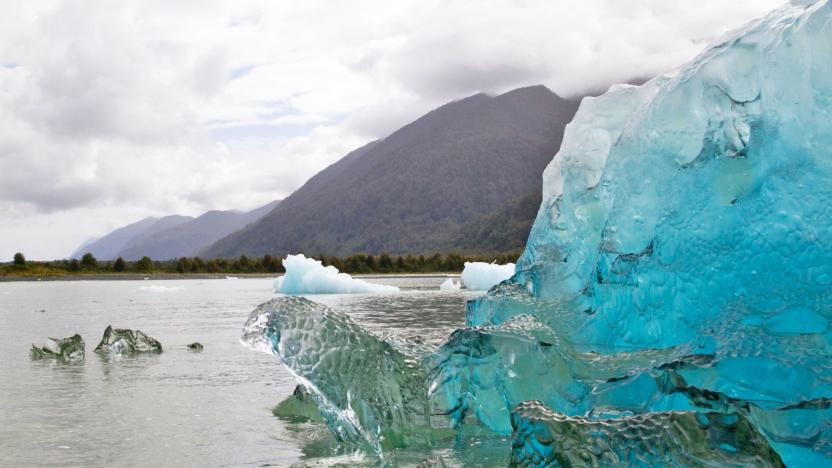
NASA can pinpoint glaciers that might flood coastal cities
It's safe to say that melting glaciers and ice sheets are bad things: they raise ocean levels and risk flooding low-lying coastal areas. But which of these icy bodies do you have to worry about in your area? NASA might help. It recently developed a technique that can determine which glaciers and sheets pose a threat to a given area. It's complex, but it could make a big difference for coastal cities that may need to react to global warming.
Jon Fingas11.20.2017
Treaty ending use of planet-warming HFCs takes effect in 2019
The treaty phasing out the use of Earth-warming hydrofluorocarbons now has an official start date. Sweden has become the 20th country to ratify the Kigali Amendment, invoking a clause that has the measure taking effect on January 1st, 2019. From then on, wealthier countries (less fortunate nations have until 2024 or 2028) must cut back on use of the greenhouse gas in everything from air conditioning to refrigerators. Ideally, this pushes companies to use and develop eco-friendly coolants.
Jon Fingas11.19.2017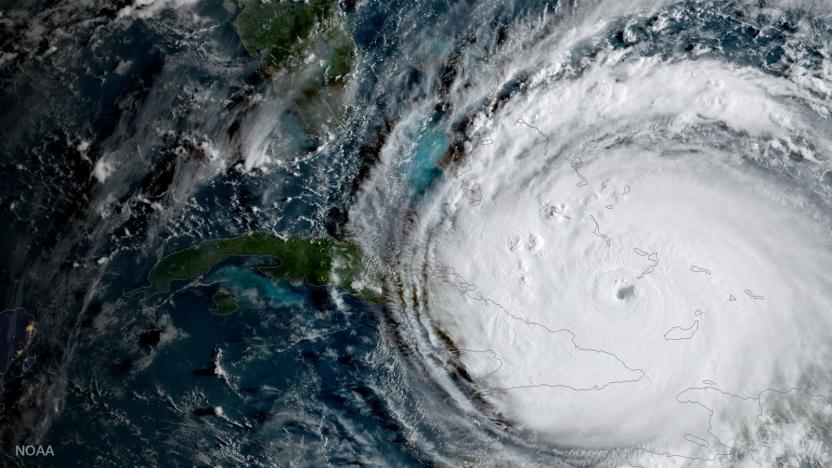
France and China will study ocean-based climate change next year
France and China, both key leaders of the Paris Climate Accord now that the US is leaving, have unveiled a new satellite to better predict storms and model climate change. The China-France Oceanography Satellite (CFOSAT) includes two radars that can study both wind strength and direction as well as the direction and wavelength of ocean waves. The latter can help scientists predict heat waves and other important climate data, according to recent studies.
Steve Dent10.23.2017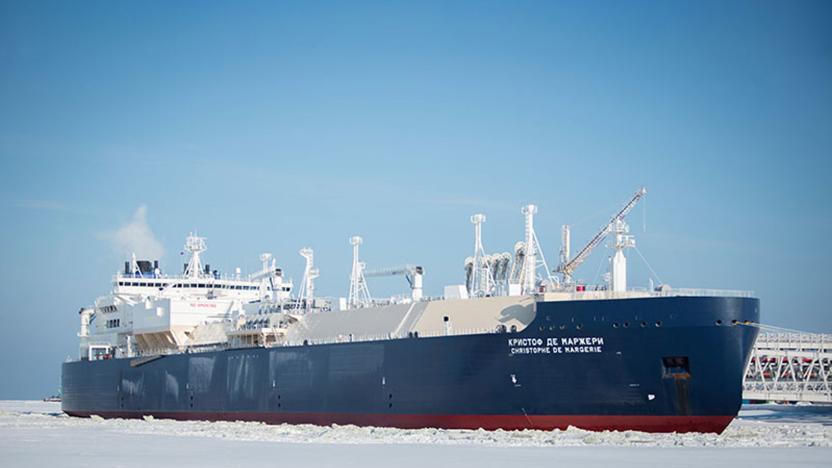
Tanker's speedy Arctic crossing is bad news for the planet
Normally, smashing a transportation record is something to celebrate. This time, however, it's not necessarily worth cheering. Sovcomflot's liquefied natural gas (LNG) tanker Christophe de Margerie has become the first merchant ship to cross the Northern Sea Route without an icebreaker clearing its path. The vessel, which can plow through ice up to 6.9 feet thick all by itself, completed the icy part of a trip from Norway to South Korea in a record-setting 6.5 days by keeping up speeds (an average of 14 knots) that would have been impractical with the usual escort. That's despite ice as thick as 3.9 feet. So what's so bad? Unfortunately, it's as much an indication of the effect of global warming as it is technological progress.
Jon Fingas08.28.2017